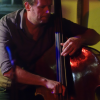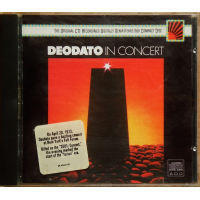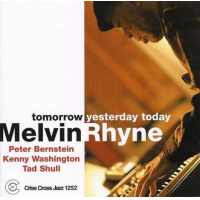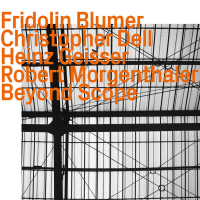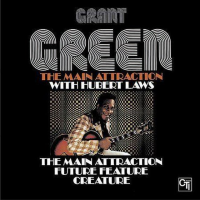Home » Jazz Articles » Liner Notes » Bill Bruford: The Summerfold Collection 1987-2008
Bill Bruford: The Summerfold Collection 1987-2008
By 1986, Bruford was looking for a new path. Crimson had again dissolved, the 1981-'84 incarnation having provided him with the opportunity to explore nascent electronic drum technology. Disinterested in pre-programming, however, Bruford wanted to apply the technology to real-time playing. Advances in polyphony and expression meant that he could, in his words, "turn into a double-headed Hydra—half keyboards, half drums."
With technology driving many of Bruford's groups, his first overt foray into jazz came armed with his innovative "chordal drums." As ever, Bruford surrounded himself with rising stars—horn player/keyboardist Django Bates, saxophonist Iain Ballamy and bassist Mick Hutton (later Tim Harries)—to make his first Earthworks a fully reciprocal and collaborative group.
The opening chords of 1987's Earthworks' "Up North" sound like a keyboard, but are triggered from drum pads. Bates' assumption of chordal duties on keyboard for Ballamy's solo is both a seamless transition and remarkable Earthworks signature. "My Heart Declares a Holiday," another Bruford/Ballamy/Bates collaboration, features a powerful drum solo speaking to Earthworks' jazz proclivities—though not like any jazz band you've ever heard—while Bates' poignant ballad, "It Needn't End in Tears" demonstrates Earthworks' nuanced ability to make more out of less.
Bruford's chordal drums open 1989's Dig? and its part-free, part-funky "Stromboli Kicks." More remarkable is the marriage of improvisation and technology during Bruford's drum solo—[a] "random collage of micro-percussion from an electronic kit containing 82 samples of little blocks, bells, finger cymbals, backwards sounds and more, played live of course," he explains. Chordal drums also anchor the Ballamy/Bruford ballad, "Pilgrim's Way," while Bates' "Candles Still Flicker in Romania's Dark," from 1991's All Heaven Broke Loose, is another uncanny blend of the acoustic and electric; Earthworks' at its most poignant and hauntingly ethereal.
With Bates off collecting one of many jazz awards, Bruford describes "call[ing] upon producer David Torn for some experimenting with tenor sax and harmonizer." Bruford and Harries then "improvised around the huge and processed sound of Iain's tenor" for All Heaven's "Temple of the Winds," proof that Bruford had fully made the leap into instantaneous creation. Earthworks navigates freely between knotty themes, irregular meters and free-wheeling improv with great aplomb on "Nerve," from 1994's Stamping Ground: Live, but between its members' busy schedules and the lure of Crimson, it would be Earthworks Edition I's final release.
Three years of high volume art rock later, Bruford was looking for a return to more intimacy, receiving a suggestion to contact Oregon co-founder Ralph Towner. The acoustic guitarist/pianist, Bruford recounts, "was perfect for the project I had in mind. Recent drummer-led records had all been about muscle and flash; I was after something altogether more poetic—softer, hazy, dreamy, autumnal, all-acoustic." The ambling title track to 1997's If Summer Had Its Ghosts, also featuring bass legend Eddie Gomez, couldn't be more elegantly lyrical or atmospherically cinematic. Electronic drums generate the sampled kalimba during the first half of the folkloric "Thistledown," but Bruford ultimately returns to his acoustic kit in an understated career watershed, as is his increased compositional involvement, writing or co-writing If Summer almost entirely.
Leaving Crimson in 1998 with a desire to continue this all-acoustic direction but with more muscle, Bruford formed a second edition of Earthworks. Heads turned in the jazz community with 1999's A Part, and Yet Apart, which introduced another group of young musicians who pushed Bruford's envelope as much as he did theirs. The shifting bars of "No Truce with the Furies," co-written with incoming pianist Steve Hamilton, raise the game from the get-go with a propulsive bass-riff from Mark Hodgson, alternating with brief sections that really swing. "Joshua Redman's work around that time reminded me that there was a powerful acoustic fusion to be had," says Bruford. The soulful "Dewey-Eyed, Then Dancing" references Redman's deceased father Dewey, highlighting ex-Incognito saxophonist Patrick Clahar's bold, robust tone—squeezing the most from every note.
"Revel without a Pause," from 2001's studio pinnacle The Sound of Surprise, proves you can swing in 5/4, while the title track, previously only available in Japan, incorporates a Middle Eastern vibe driven by Hamilton's prepared piano. "Come to Dust" explores, at length, "the same kind of melancholy as Michiel Borstlap is all about immediacy. 2004's Every Step a Dance, Every Word a Song practically defines 'spontaneous composition' with the Duo's music being almost entirely improvised. Bruford, pointing to the powerful and completely improvised "The 16 Kingdoms of the 5 Barbarians," maintains: "It's all about listening closely to your partner. I still get vertigo every time I approach the drum stool for a concert with Michiel, with no prepared music. We try to stay unconcerned with boundaries and notions of 'genre purity.' We feel free to wander, and admire the view." 2007's In Two Minds gentle "Kinship" and expansive "From the Source, We Tumble Headlong" demonstrate the palpable growth of Bruford's most intimate current project.
The World Drummers Ensemble—featuring percussionists Chad Wackerman, Luis Conte and Doudou N'Diaye Rose—creates another artistic influx. "Without obvious western pitches, your sense of melody goes to the pitches of the drums, increasing and refining your awareness of pitch," Bruford says to describe 2006's Coat of Many Colors' "Baye Kane N'Diaye"
With recent improvements in technology, Summerfold's pristine recordings are now as likely to be live. Most of this collection's second CD is culled from live albums, including 2004's Random Acts of Happiness, with woodwind multi-instrumentalist/composer Tim Garland replacing Clahar. The serpentine, Latin-esque Garland/Bruford composition "White Knuckle Wedding" provides notice of a new and influential voice, here expanding Earthworks' palette on flute. Bruford enthusiastically recalls "faxing music based on a series of four related rhythms in 11/4 to Tim and getting a little symphony back the next day. Love it!"
"Good jazz is more likely to happen on stage, in my experience," continues Bruford, supported by 2006's Earthworks Underground Orchestra, recorded at New York's Iridium Jazz Club with Garland and a mini-big band featuring some of the city's finest. "Footloose and Fancy Free" is even more exciting than the version on A Part, with Garland's tenor an equally imaginative but less visceral alternative to Clahar. Trombonist Robin Eubanks' solo is, Bruford asserts, "astonishing, especially since this is the first time he's playing the tune."
Continuing his exploration of the intimate, the responsive and the improvised, Bruford is beginning to revisit earlier material. "Beelzebub," from Bruford's first solo album, 1977's Feels Good to Me, is the perfect way to close the circle between the Summerfold and Winterfold collections. Garland expands guitarist Allan Holdsworth's role on soprano saxophone and bass clarinet, while Hodgson's acoustic bass sharply contrasts Jeff Berlin's electric and Hamilton reduces Dave Stewart's array of keyboards to a single acoustic piano. Bruford is both reverential and open-ended, especially during Hamilton's solo, where new ways are found to navigate the complex changes.
An exciting reading that proves the many threads winding their way throughout Bruford's career remain consistent. Compelling writing, loose and open-minded improvisation, group interaction and surrendering to the will of the music—all markers found, in varying degrees throughout a remarkable career that will no doubt continue along previously uncharted pathways.
Related
Bill Bruford: The Winterfold Collection 1978-1986
Liner Notes copyright © 2026 John Kelman.
The Summerfold Collection 1987-2008 can be purchased here.
Contact John Kelman at All About Jazz.
With the realization that there will always be more music coming at him than he can keep up with, John wonders why anyone would think that jazz is dead or dying.
Track Listing
CD1: Up North (Bill Bruford's Earthworks MKI); My Heart Declares a Holiday (Bill Bruford's Earthworks MKI); Pilgrims Way (Bill Bruford's Earthworks MKI); Stromboli Kicks (Bill Bruford's Earthworks MKI); Temple of the Winds (Bill Bruford's Earthworks MKI); Candles Still Flicker in Romania's Dark (Bill Bruford's Earthworks MKI); Nerve (Bill Bruford's Earthworks MKI); It Needn't End in Tears (Bill Bruford's Earthworks MKI); If Summer Had Its Ghosts (with Ralph Towner & Eddie Gomez); Thistledown (with Ralph Towner & Eddie Gomez); Dewey-Eyed, Then Dancing (Bill Bruford's Earthworks MKII); No Truce With the Furies (Bill Bruford's Earthworks MKII). CD2: Revel Without a Pause (Bill Bruford's Earthworks MKII); The Sound of Surprise (Bill Bruford's Earthworks MKII); The 16 Kingdoms of the 5 Barbarians (with Michiel Borstlap); Kinship (with Michiel Borstlap); From the Source, We Tumble Headlong (with Michiel Borstlap); Baye Kene N'Diaye (The World Drummers Ensemble); Footloose and Fancy Free (Tim Garland's Underground Orchestra); Come to Dust (Bill Bruford's Earthworks MKII); White Knuckle Wedding (Bill Bruford's Earthworks MKII, featuring Tim Garland); Beelzebub (Bill Bruford's Earthworks MKII, featuring Tim Garland).
Personnel
Bill Bruford
drumsDjango Bates
pianoIain Ballamy
saxophone, tenorMick Hutton
bassTim Harries
bassRalph Towner
guitarEddie Gomez
bassPatrick Clahar
saxophoneSteve Hamilton
pianoMark Hodgson
bassMichiel Borstlap
pianoTim Garland
clarinet, bassJon Owens
trumpetAlex Sipiagin
trumpetRock Ciccarone
tromboneRobin Eubanks
tromboneChris Karlic
saxophone, baritoneSteve Wilson
saxophoneHenry Hey
pianoMike Pope
bassAdditional Instrumentation
Bill Bruford: acoustic, electronic and chordal drums, percussion, log drum; Django Bates: Eb tenor horn (CD1#1, CD1#4, CD1#6), keyboards (CD1#1-4, CD1#6-8), pocket trumpet (CD1#4); Iain Ballamy: alto saxophone (CD1#1), tenor saxophone (CD1#2-3, CD1#5-6, CD1#8), soprano saxophone (CD1#4, CD1#7), loops (CD1#5- 6); Mick Hutton: bass (CD1#1-2, CD1#8); Tim Harries: bass (CD1#3-7); Ralph Towner: 12-string guitar (CD1#9), piano (CD1#9-10), guitar (CD1#10); Eddie Gomez: bass (CD1#9-10); Patrick Clahar: tenor saxophone (CD1#11- 12, CD2#1-2, CD2#8), soprano saxophone (CD2#2); Steve Hamilton: piano (CD1#11-12, CD2#1-2, CD2#8-10); Mark Hodgson: bass (CD1#11-12, CD2#1-2, CD2#8-10); Michiel Borstlap: piano (CD2#3-5), keyboards (CD2#3, CD2#5); Doudou N'Diaye Rose: sabar (CD2#6); Chad Wackerman: drums (CD2#6); Luis Conte: conga drums (CD2#6); Jon Owens: trumpet (CD2#7); Alex "Sasha" Sipiagin: trumpet (CD2#7); Robin Eubanks: trombone (CD2#7); Steve Wilson: alto saxophone (CD2#7); Tim Garland: tenor saxophone (CD2#7), flute (CD2#9), soprano saxophone (CD2#10), bass clarinet (CD2#10); Chris Karlic: baritone saxophone (CD2#7); Henry Hey: piano (CD2#7); Mike Pope: bass (CD2#7).
Album information
Title: The Summerfold Collection 1987-2008 | Year Released: 2009 | Record Label: KOCH Records
Tags
PREVIOUS / NEXT
Support All About Jazz
 All About Jazz has been a pillar of jazz since 1995, championing it as an art form and, more importantly, supporting the musicians who make it. Our enduring commitment has made "AAJ" one of the most culturally important websites of its kind, read by hundreds of thousands of fans, musicians and industry figures every month.
All About Jazz has been a pillar of jazz since 1995, championing it as an art form and, more importantly, supporting the musicians who make it. Our enduring commitment has made "AAJ" one of the most culturally important websites of its kind, read by hundreds of thousands of fans, musicians and industry figures every month.







